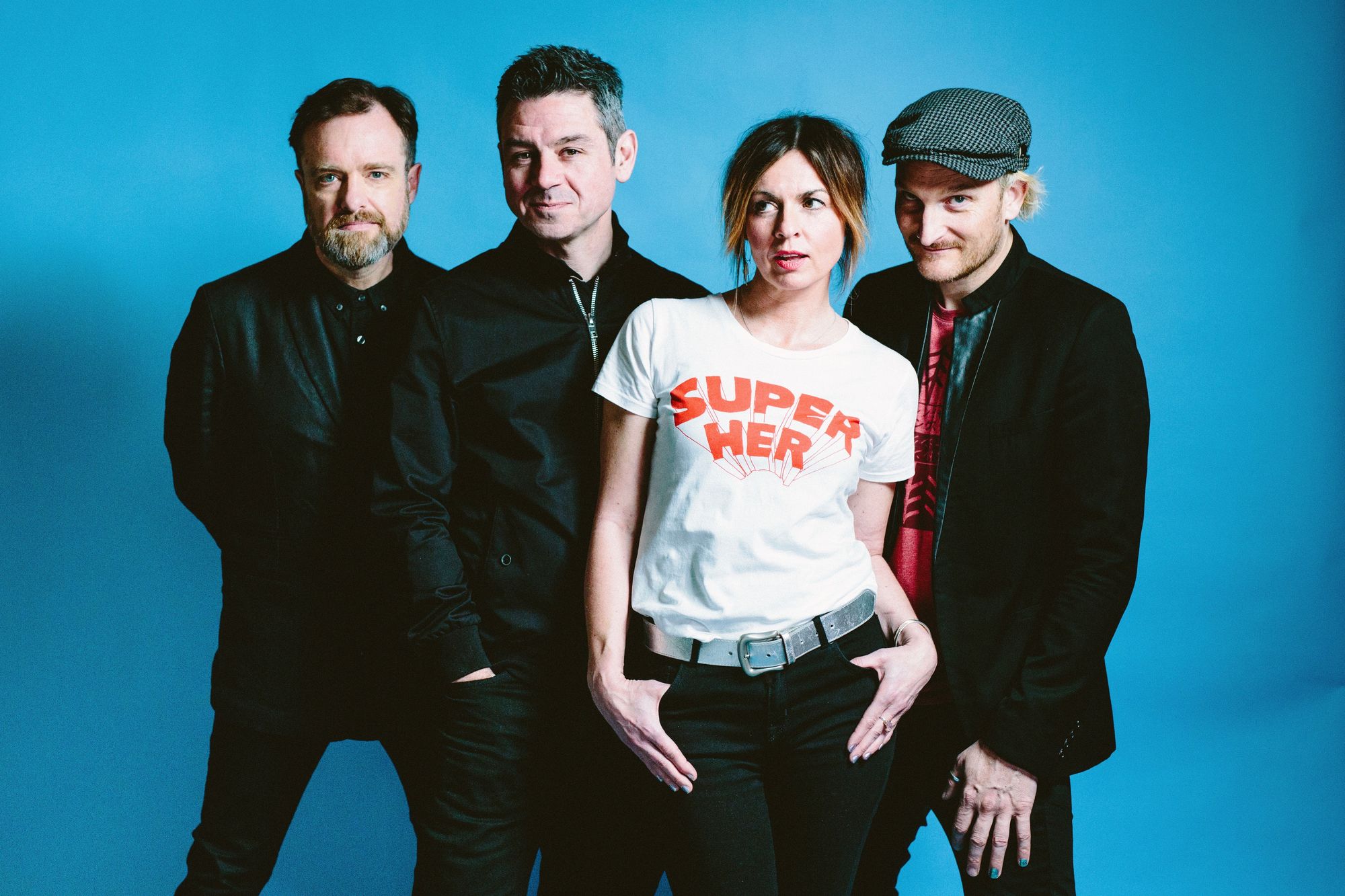By Kate Jeffrie, First Year English
Sleeper’s front-woman Louise Wener gets candid about the band’s role in Britpop, their part in the Trainspotting soundtrack, and today’s cancel culture ahead of their 25th anniversary tour of hit 1995 album ‘The It Girl’.
When you think of Britpop – the bright, bloke-ish movement in 1990s British music that watched Blur, Oasis, and Pulp swagger onto the scene – Sleeper might not be the first band that comes to mind. Yet, if you’re familiar with the iconic Trainspotting soundtrack or music shows from the era, you’ll soon realise their influence and the part they played in this cultural phenomenon. Now, 25 years after Sleeper’s most successful album, ‘The It Girl’ – which reached No. 5 in the UK album charts – was released, you’ve got a chance to see the band perform it in full.
While you might consider Sleeper a heritage band, frontwoman Louise believes their music still resonates with modern audiences. “We had this time away to clue into it in a modern way; you find new things that resonate,” she says. “The song that we finish the set with, ‘Sale of the Century’, has the line ‘It’s never gonna be this good / So just climb in’, and the audience sings along. They’re imbuing it with a sense of meaning that acknowledges the in-between years.”

For a lot of young people, Britpop hits like Pulp’s ‘Common People’, Oasis’s ‘Wonderwall’, or Blur’s ‘Country House’ hark back to a time when things seemed easier: when smoking cigarettes, drinking beer, and knowing a few guitar chords were a lifestyle rather than a youthful vice. Today, you’ll find that half the pubs on Bristol’s King Street are a time capsule for the decade. But, Louise says, Sleeper didn’t set out to actively create a new movement at the time; they were just making the music they wanted to. “You’re forced to look at music with a cultural perspective,” she says. “We’re always asked questions about how we fit into Britpop, or into the 90s, but when you’re writing it at the time, you’re just thinking, ‘have I written a melody that people might like?’” She believes bands had real freedom back in the nineties, a time before social media and all its pressures, and worries this means the “fun is missing for bands of today.”
“They’re feeling careful,” she says. “Everything is analysed. Nothing has a life of its own for very long, because it’s immediately talked about on social media – taken down or lifted up – and then it’s gone. I think there was a greater depth of expression; we felt [our music] would live for a while.” The time was an “optimistic period”, a “golden age.” It felt important.
While ‘The It Girl’ had all the hallmarks of the Britpop moment – the energy, humour, and melodic guitar hooks – Sleeper’s frontwoman and focus on the female experience set them apart from the lad culture that underpinned much of this movement at the time. Louise wrote about her experience in her songs, saying the song ‘Lie Detector’ – the album’s first track – is “about how women are stereotyped and put into boxes, and not allowed to escape the way they were originally viewed. Once people have decided who you are, you’re there forever. [Those songs were borne] out of my frustration with that.”

With her Cool Britannia t-shirts and pixie cut, Louise became a sex symbol of the decade, earning high spots on NME and Melody Maker’s “Sexiest Woman” polls. She was all too aware, however, of the sexism in the industry and how differently she was treated as a frontwoman in an era when men dominated.
She recalls, when Sleeper toured with Blur, the contrast between how she was perceived compared with other contemporary frontmen like Damon Albarn. “It was extraordinary,” she says. “There were a couple of [our] songs that had vaguely sexual lyrics on them, and then it became [my] thing forever. It was as though people said, ‘There’s no depth, there’s nothing else behind it. That’s just her. She’s sexual, and that’s everything’, and that’s all you are, forever. If you have something to say, then that means you’re ‘feisty’ and ‘opinionated’. It was like, ‘she should really stop taking up so much damn space and give it to Damon instead!’”
Whether she wanted it to be or not, Wener’s “femaleness” was a major talking point during the period. There was a vast difference between how her role as front-woman and her bandmates, AKA the “Sleeperblokes” – the guitarist, bassist, and drummer, who were essentially ignored by the press – were viewed. “It was kind of reverse-sexism. For the life of me, I can’t identify anyone in Coldplay besides Chris Martin, but it’s always been the front-person [in music] who’s been central. I think what they were trying to do was belittle the men in our band, like, ‘you’ve got a woman at the front. You’ve got a woman telling you what to do. You’ve got a woman writing the songs.’ In some way that degrades you.”
The It Girl is TOURING! April/May! What do you want to hear most? https://t.co/3SmJ4c2wVl pic.twitter.com/QpEWpS12U9
— Louise Wener (@ReaLouisewener) February 10, 2022
Louise started out in music at a time when this culture was being created. Sleeper had first made the rounds as a band around the grunge clubs in London after Louise and Jon Stewart (guitar) met at the University of Manchester. “I was just learning how to do it as I hadn’t picked up a guitar before – I never knew any girls who played guitar or were in bands when I was at school. I just decided, ‘I’m going to do this’, and I joined a band, and the songs were shit so I thought, ‘I’m going to start writing them instead.’ I learned how to do it.”
Louise has spoken in the past about how female-fronted grunge bands have inspired her. I ask her what it is about female-fronted bands like Hole that speak to her so directly. “I liked to see those women out there; it was quite seismic, I think.” However, she did have some concerns. “There were parts that I loved and parts that I didn’t. There were ideologies involved in all that stuff that I wasn’t completely on board with, and I didn’t want to have another set of restrictions. I think at the time the music was slightly anti-identity politics. Don’t define us as women at all; just let us be a person in a band. I don’t want to fixate on my femaleness. I don’t want that to be the issue.”
As well as debut album ‘Smart’, platinum-selling follow-up ‘The It Girl’ and 1997’s ‘Pleased to Meet You’, younger music fans might know the band best for the cover of Blondie’s hit ‘Atomic’ that features in Danny Boyle’s 1996 Trainspotting, over the scene in which Renton (Ewan McGregor) first sets eyes on Diane (Kelly Macdonald) in a nightclub. “We had no idea that it was going to become this big cultural moment,” says Louise. “They were asking so many of the bands that were contemporary at the time, ‘do you want to add something to it?’, and it just so happened that we said yes! I think they wanted to have Blondie’s ‘Atomic’ in it, but Blondie was charging too much so they asked, ‘will you do a version of it?’” Louise laughs. “‘But can you make it almost exactly like Blondie’s… absolutely nothing different?’” Many say this iconic soundtrack album sums up the nineties, and Sleeper certainly played their part.
Dark, Twisted Southern Funk: In conversation with Rob Spragg
Review: Big Thief @ O2 Shepherd’s Bush Empire, London
Sleeper are performing at the O2 Academy Bristol on April 28th. Tickets are available here. The gig will be a chance for music fans to experience – or relive – their glory days.
Will you be going to see Sleeper?








